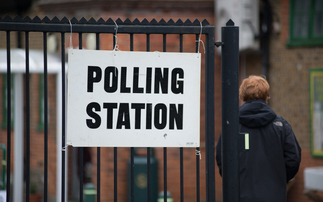The symbolic legislation seeks to compel the administration to adhere to its climate pledges and cut off funding for the US withdrawal from Paris
US Democrats signalled support for the Paris climate deal on Thursday, in the first major climate legislation in almost 10 years to pass one of the houses of congress.
The Climate Action Now Act, which is sponsored by 224 Democrats but does not include a single Republican backer, prohibits the use of federal funds in leaving the Paris Agreement. Although the costs are likely to be minimal.
It also compels the government to comply with the country's national climate pledges. President Donald Trump would need to report to congress within 120 days on his plans to meet the obligations.
It passed the house 231 votes to 190.
"Republicans are defending the Trump's administration's action to undercut and isolate the US as the only country to withdraw the Paris Accord, placing us firmly on the wrong side of History," US Democrat congressman from Oregon, Earl Blumenauer, told the US Congress on Thursday. "In contrast, I'm thankful that today's action demonstrates that Democrats are on the side of protecting our children's future. H.R.9. is a first step towards a future of climate action and climate justice, a Green New Deal for clean energy jobs, rebuilding and renewing out sustainable agriculture and environmental justice."
With a Republican-controlled senate highly unlikely to give it any floor time and a White House threat to veto, its value is largely symbolic.
"This is a messaging bill that obviously is aimed at the public and at sending a message at other countries," Alden Meyer, director of strategy and policy for the Union of Concerned Scientists, told Climate Home News.
The text, also known as H.R.9, "fills the vacuum of federal leadership that we've seen in the last couple of years since Trump took office," Meyer said. "It sends a signal of hope to those around the world that not everyone agrees with president Trump to withdraw from Paris and abdicate on climate."
House speaker Nancy Pelosi told journalists in March that the act amounted to "taking first strong steps to protect our planet and our future".
"We refuse to accept the notion that this is not something that needs to be addressed," Democrat congressman Frank Pallon from New Jersey also said in March. "So, Mr. President, we're saying to you with this legislation, we're not withdrawing from Paris."
In a possible nod to Trump, who has repeatedly opposed climate action on the grounds that countries like China may not be doing their share, the bill calls on the government "to use the Paris Agreement's transparency provisions to confirm that other parties to the Agreement with major economies are fulfilling their announced contributions".
H.R.9. was " inconsistent with the president's commitment to put American workers and families first, promote access to affordable, reliable energy sources and technologies, and improve the quality of life for all Americans," a statement this week said.
The act comes amid growing momentum for climate action in the country. In February, Congresswoman Alexandria Ocasio-Cortez submitted the US' first Green New Deal resolution to Congress.
Resolve among Democrats did not extend to the senate, however. Unusually for a high-profile text, Democrats did not introduce a companion measure to the Climate Action Now Act.
"I wish I could shed more light on the operations of the US Senate - it confounds all of us on the House side," Kathy Castor, the bill's sponsor and chairwoman of the House Select Committee on Climate Crisis, told political newspaper The Hill.
Anti-climate, Republican groups have come out against H.R.9., slamming it as "really a vote for key parts of the Green New Deal". In a letter on 30 April, the Competitive Enterprise Institute and other groups argue that "the Paris climate treaty would place the US economy at a global disadvantage by locking the country into energy-rationing policies that competitors, like China are not pursuing".
On Thursday, Republicans unsuccessfully attempted to amend the bill to reflect this concern.
Meyer believes that Republicans are increasingly mindful of the urgency to take climate action, however, with public denials of climate science on the wane.
"I talk to people in Republican groups that are up in the Hill every day, to members and senators in their offices privately. They say that they'll acknowledge that the problem is real, that we need significant solutions. Many of them would support a price on carbon, but, with a few exceptions, they're not willing to say that publicly by and large because they're concerned by the reactions of the hardline, anti-climate elements in their own party," he said.
This article first appeared at Climate Home News







